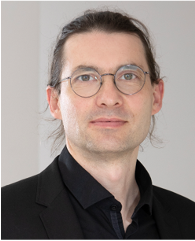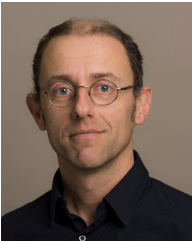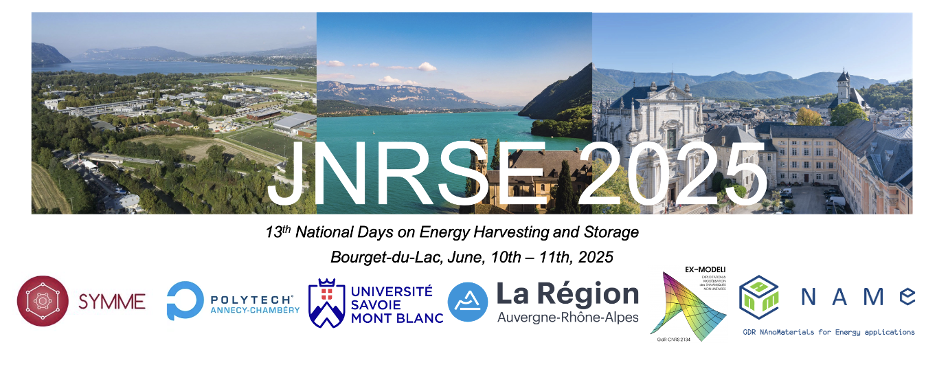Orateurs invités
|
Emmanuel Defay, Luxembourg Institute of Science and Technology, Luxembourg :
"Large harvested energy with non linear pyroelectric materials"

Cooling with solid-state electrocaloric materials has been intensively studied in recent years. Despite these efforts, the cooling industry is still waiting for a convincing, competitive demonstrator that takes over the challenge. In this talk, I will introduce the electrocaloric effect and the best materials exhibiting this effect. The core of the presentation will be about cooling devices based on electrocaloric materials. More specifically, I will give details about fluid-based electrocaloric regenerators. These devices are subtle to design and use because one needs to combine materials science, thermodynamics and electrical engineering to have them running properly. Recent results obtained on electrocaloric regenerators using lead scandium tantalate multilayer capacitors will be disclosed, showing that it is possible to reach temperature spans larger than 20 K at room temperature and cooling power of several watts with a few grams of active material. The limits of this approach will be discussed. I will also talk about the reverse thermodynamic effect that is intimately related to the electrocaloric effect, namely the pyroelectric effect that recently gave excellent results in transforming waste heat in electricity.
-----------------
Francesco Cottone, University of Perugia, Italy :
"Eco-Friendly 3D-Printed Energy Harvesting Devices Using Biocompatible Piezo-Electret Polymers"
Piezo-electret polymers convert mechanical energy into electricity through a gas-filled polymer matrix, making them ideal for sensors and energy harvesting. Conventional synthetic materials like polypropylene and Teflon pose environmental concerns. This talk presents sustainable 3D-printed energy harvesters using low-cost, eco-friendly foamed polymers, such as polylactic acid blended with natural wax composites as electrets and integrated with graphene electrodes. These materials offer a promising pathway for greener energy conversion technologies.
-----------------
Martial Defoort, CNRS, TIMA, France :
"Ultrasounds for embedded applications : from power transfer to secured communications"

This presentation will focus on the generation and exploitation of ultrasound produced by piezoelectric transducers ranging from centimeter-scale devices (e.g., ceramic types) to micrometer-scale devices (e.g., PMUTs), operating from the linear to the nonlinear regime. The first part will emphasis on the use of these devices in the linear regime for wireless power transfer, with the goal of efficiently recharging medical implants located deep within the human body. Preliminary results demonstrate that acoustic energy can be transmitted through biological tissues at power levels sufficient to supply devices such as pacemakers, while complying with medical safety requirements.
In the second part, we will explore the potential of the nonlinear regime of PMUTs, particularly their ability to generate chaotic signals, for use in acoustic cryptography. By leveraging the intrinsic dynamic complexity of these systems, it becomes possible to envision secure communication schemes between external devices and medical implants, making data exchanges more resistant to interception or hacking. This presentation will highlight the feasibility of generating such chaotic behavior using standard PMUTs, without requiring significant hardware modifications, paving the way for easy integration into existing systems and offering a promising new avenue for securing connected implants.
-----------------
Olivier Bourgeois, Institut Néel, France :
"New thermomoelectric thin films of (2D materials) for energy harvesting at the nanoscale"

With the emergence of low power communication protocols, there is a large demand for autonomous micro-sources of energy that can deliver few tens of microWatt. Moreover, as sizes of chips are shrinking massively, there is an emerging need of collecting this energy at very low dimension close to the source of heat. At Institut Néel we have developed an expertise in the elaboration of suspended thermal sensors: membrane based thermoelectric nano-TEG; planar nano-TEG are made of silicon nitride membranes equipped with p-n junctions. The proof of concept has been validated using Bi 2Te 3 n and p types TE thin films (ZT ~ 0.2). The MOIZ start-up, spin-off from Institut NEEL, is currently commercializing TE based energy harvester based on this technology. However, since these materials are toxic and finally limited in performance, we are looking for innovative materials and architecture to boost the performance and enlarge the application field of TE energy harvester without having to rely on bismuth telluride. First, we will show the performance of large arrays of membranes, constituting the planar nanoTEG. By using the Harman method, we can directly obtain the ZT value of the full device based on bismuth telluride. Second, we will show the thermoelectric properties measured on new materials with high potential like Transition-Metal Dichalcogenide (TMD) 2D materials. A specific lab-on-chip has been developed to obtained Seebeck, s and power factor on ultra-thin layers of SnSe 2 and PtSe 2. Future prospectives on topological insulator like WeSe 2 will be also discussed along with new architecture to include them in real devices.
In collaboration with : N. Aubergier, N. Chessel, E. Desgué, P. Legagneux, D. Tainoff, O. Bourgeois
|
|


 Chargement...
Chargement...